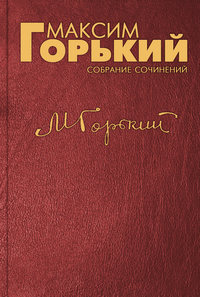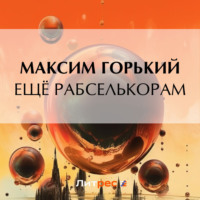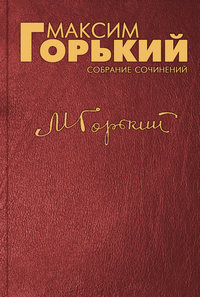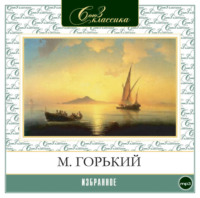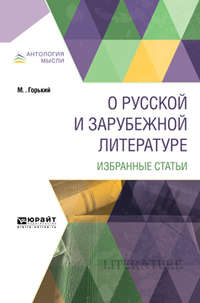 полная версия
полная версияThe Man Who Was Afraid
“Very well! We’ll see who will conquer,” he thought the next day, watching his wife with stern curiosity; and in his soul a strong desire was already raging to start the strife, that he might enjoy his victory the sooner.
But about four days later, Natalya Fominichna announced to her husband that she was pregnant.
Ignat trembled for joy, embraced her firmly, and said in a dull voice:
“You’re a fine fellow, Natalya! Natasha, if it should be a son! If you bear me a son I’ll enrich you! I tell you plainly, I’ll be your slave! By God! I’ll lie down at your feet, and you may trample upon me, if you like!”
“This is not within our power; it’s the will of the Lord,” said she in a low voice.
“Yes, the Lord’s!” exclaimed Ignat with bitterness and drooped his head sadly.
From that moment he began to look after his wife as though she were a little child.
“Why do you sit near the window? Look out. You’ll catch cold in your side; you may take sick,” he used to say to her, both sternly and mildly. “Why do you skip on the staircase? You may hurt yourself. And you had better eat more, eat for two, that he may have enough.”
And the pregnancy made Natalya more morose and silent, as though she were looking still deeper into herself, absorbed in the throbbing of new life within her. But the smile on her lips became clearer, and in her eyes flashed at times something new, weak and timid, like the first ray of the dawn.
When, at last, the time of confinement came, it was early on an autumn morning. At the first cry of pain she uttered, Ignat turned pale and started to say something, but only waved his hand and left the bedroom, where his wife was shrinking convulsively, and went down to the little room which had served his late mother as a chapel. He ordered vodka, seated himself by the table and began to drink sternly, listening to the alarm in the house and to the moans of his wife that came from above. In the corner of the room, the images of the ikons, indifferent and dark, stood out confusedly, dimly illumined by the glimmering light of the image lamp. There was a stamping and scraping of feet over his head, something heavy was moved from one side of the floor to the other, there was a clattering of dishes, people were bustling hurriedly, up and down the staircase. Everything was being done in haste, yet time was creeping slowly. Ignat could hear a muffled voice from above,
“As it seems, she cannot be delivered that way. We had better send to the church to open the gates of the Lord.”
Vassushka, one of the hangers-on in his house, entered the room next to Ignat’s and began to pray in a loud whisper:
“God, our Lord, descend from the skies in Thy benevolence, born of the Holy Virgin. Thou dost divine the helplessness of human creatures. Forgive Thy servant.”
And suddenly drowning all other sounds, a superhuman, soul-rending cry rang out, and a continuous moan floated softly over the room and died out in the corners, which were filled now with the twilight. Ignat cast stern glances at the ikons, heaved a deep sigh and thought:
“Is it possible that it’s again a daughter?”
At times he arose, stupidly stood in the middle of the room, and crossed himself in silence, bowing before the ikons; then he went back to the table, drank the vodka, which had not made him dizzy during these hours, dozed off, and thus passed the whole night and following morning until noon.
And then, at last, the midwife came down hastily, crying to him in a thin, joyous voice.
“I congratulate you with a son, Ignat Matveyich!”
“You lie!” said he in a dull voice. “What’s the matter with you, batushka!” Heaving a sigh with all the strength of his massive chest, Ignat went down on his knees, and clasping his hands firmly to his breast, muttered in a trembling voice:
“Thank God! Evidently Thou didst not want that my stem should be checked! My sins before Thee shall not remain without repentance. I thank Thee, Oh Lord. Oh!” and, rising to his feet, he immediately began to command noisily:
“Eh! Let someone go to St. Nicholas for a priest. Tell him that Ignat Matveyich asked him to come! Let him come to make a prayer for the woman.”
The chambermaid appeared and said to him with alarm:
“Ignat Matveyich, Natalya Fominichna is calling you. She is feeling bad.”
“Why bad? It’ll pass!” he roared, his eyes flashing cheerfully. “Tell her I’ll be there immediately! Tell her she’s a fine fellow! I’ll just get a present for her and I’ll come! Hold on! Prepare something to eat for the priest. Send somebody after Mayakin!”
His enormous figure looked as though it had grown bigger, and intoxicated with joy, he stupidly tossed about the room; he was smiling, rubbing his hands and casting fervent glances at the images; he crossed himself swinging his hand wide. At last he went up to his wife.
His eyes first of all caught a glimpse of the little red body, which the midwife was bathing in a tub. Noticing him, Ignat stood up on tiptoes, and, folding his hands behind his back, walked up to him, stepping carefully and comically putting forth his lips. The little one was whimpering and sprawling in the water, naked, impotent and pitiful.
“Look out there! Handle him more carefully! He hasn’t got any bones yet,” said Ignat to the midwife, softly.
She began to laugh, opening her toothless mouth, and cleverly throwing the child over from one hand to the other.
“You better go to your wife.”
He obediently moved toward the bed and asked on his way:
“Well, how is it, Natalya?”
Then, on reaching her, he drew back the bed curtain, which had thrown a shadow over the bed.
“I’ll not survive this,” said she in a low, hoarse voice.
Ignat was silent, fixedly staring at his wife’s face, sunk in the white pillow, over which her dark locks were spread out like dead snakes. Yellow, lifeless, with black circles around her large, wide-open eyes – her face was strange to him. And the glance of those terrible eyes, motionlessly fixed somewhere in the distance through the wall – that, too, was unfamiliar to Ignat. His heart, compressed by a painful foreboding, slackened its joyous throbbing.
“That’s nothing. That’s nothing. It’s always like this,” said he softly, bending over his wife to give her a kiss. But she moaned right into his face:
“I’ll not survive this.”
Her lips were gray and cold, and when he touched them with his own he understood that death was already within her.
“Oh, Lord!” he uttered, in an alarmed whisper, feeling that fright was choking his throat and suppressing his breath.
“Natasha? What will become of him? He must be nursed! What is the matter with you?”
He almost began to cry at his wife. The midwife was bustling about him; shaking the crying child in the air. She spoke to him reassuringly, but he heard nothing – he could not turn his eyes away from the frightful face of his wife. Her lips were moving, and he heard words spoken in a low voice, but could not understand them. Sitting on the edge of the bed, he spoke in a dull and timid voice: “Just think of it! He cannot do without you; he’s an infant! Gather strength! Drive this thought away from you! Drive it away.”
He talked, yet he understood he was speaking useless words. Tears welled up within him, and in his breast there came a feeling heavy as stone and cold as ice.
“Forgive me. Goodbye! Take care. Look out. Don’t drink,” whispered Natalya, soundlessly.
The priest came, and, covering her face with something, and sighing, began to read gentle, beseeching words:
“Oh God, Almighty Lord, who cureth every disease, cure also Thy servant Natalya, who has just given birth to a child; and restore her from the bed on which she now lies, for in the words of David, ‘We indulge in lawlessness and are wicked in Thine eyes.”’
The old man’s voice was interrupted now and then, his thin face was stern and from his clothes came the odour of rock-rose.
“Guard the infant born of her, guard him from all possible temptation, from all possible cruelty, from all possible storms, from evil spirits, night and day.”
Ignat listened to the prayer, and wept silently. His big, hot tears fell on the bare hand of his wife. But the hand, evidently, did not feel that the tears were dropping upon it: it remained motionless, and the skin did not tremble from the fall of the tears. After the prayer Natalya became unconscious and a day later she died, without saying another word – she died just as quietly as she had lived. Having arranged a pompous funeral, Ignat christened his son, named him Foma, and unwillingly gave his boy into the family of the godfather, his old friend Mayakin, whose wife, too, had given birth to a child not long before. The death of his wife had sown many gray hairs in Ignat’s dark beard, but in the stern glitter of his eyes appeared a new expression, gentle, clear and mild.
CHAPTER II
MAYAKIN lived in an enormous two-story house near a big palisade, where sturdy, old spreading linden trees were growing magnificently. The rank branches covered the windows with a dense, dark embroidery, and the sun in broken rays peeped into the small rooms, which were closely crowded with miscellaneous furniture and big trunks, wherefore a stern and melancholy semi-darkness always reigned there supreme. The family was devout – the odour of wax, of rock-rose and of image-lamp oil filled the house, and penitent sighs and prayers soared about in the air. Religious ceremonials were performed infallibly, with pleasure, absorbing all the free power of the souls of the dwellers of the house. Feminine figures almost noiselessly moved about the rooms in the half-dark, stifling, heavy atmosphere. They were dressed in black, wore soft slippers on their feet, and always had a penitent look on their faces.
The family of Yakov Tarazovich Mayakin consisted of himself, his wife, a daughter and five kinswomen, the youngest of whom was thirty-four years old. These were alike devout and impersonal, and subordinate to Antonina Ivanovna, the mistress of the house. She was a tall, thin woman, with a dark face and with stern gray eyes, which had an imperious and intelligent expression. Mayakin also had a son Taras, but his name was never mentioned in the house; acquaintances knew that since the nineteen-year-old Taras had gone to study in Moscow – he married there three years later, against his father’s will – Yakov disowned him. Taras disappeared without leaving any trace. It was rumoured that he had been sent to Siberia for something.
Yakov Mayakin was very queerly built. Short, thin, lively, with a little red beard, sly greenish eyes, he looked as though he said to each and every one:
“Never mind, sir, don’t be uneasy. Even though I know you for what you are, if you don’t annoy me I will not give you away.”
His beard resembled an egg in shape and was monstrously big. His high forehead, covered with wrinkles, joined his bald crown, and it seemed as though he really had two faces – one an open, penetrating and intellectual face, with a long gristle nose, and above this face another one, eyeless and mouthless, covered with wrinkles, behind which Mayakin seemed to hide his eyes and his lips until a certain time; and when that time had arrived, he would look at the world with different eyes and smile a different smile.
He was the owner of a rope-yard and kept a store in town near the harbour. In this store, filled up to the ceiling with rope, twine, hemp and tow, he had a small room with a creaking glass door. In this room stood a big, old, dilapidated table, and near it a deep armchair, covered with oilcloth, in which Mayakin sat all day long, sipping tea and always reading the same “Moskovskiya Vedomosty,” to which he subscribed, year in and year out, all his life. Among merchants he enjoyed the respect and reputation of a “brainy” man, and he was very fond of boasting of the antiquity of his race, saying in a hoarse voice:
“We, the Mayakins, were merchants during the reign of ‘Mother’ Catherine, consequently I am a pure-blooded man.”
In this family Ignat Gordyeeff’s son lived for six years. By the time he was seven years old Foma was a big-headed, broad-shouldered boy, seemingly older that his years, both in his size and in the serious look of his dark, almond-shaped eyes. Quiet, silent and persistent in his childish desires, he spent all his days over his playthings, with Mayakin’s daughter, Luba, quietly looked after by one of the kinswomen, a stout, pock-marked old maid, who was, for some reason or other, nicknamed “Buzya.” She was a dull, somewhat timid creature; and even to the children she spoke in a low voice, in words of monosyllables. Having devoted her time to learning prayers, she had no stories to tell Foma.
Foma was on friendly terms with the little girl, but when she angered or teased him he turned pale, his nostrils became distended, his eyes stared comically and he beat her audaciously. She cried, ran to her mother and complained to her, but Antonina loved Foma and she paid but little attention to her daughter’s complaints, which strengthened the friendship between the children still more. Foma’s day was long and uniform. Getting out of bed and washing himself, he used to place himself before the image, and under the whispering of the pock-marked Buzya he recited long prayers. Then they drank tea and ate many biscuits, cakes and pies. After tea – during the summer – the children went to the big palisade, which ran down to a ravine, whose bottom always looked dark and damp, filling them with terror. The children were not allowed to go even to the edge of the ravine, and this inspired in them a fear of it. In winter, from tea time to dinner, they played in the house when it was very cold outside, or went out in the yard to slide down the big ice hill.
They had dinner at noon, “in Russian style,” as Mayakin said. At first a big bowl of fat, sour cabbage soup was served with rye biscuits in, but without meat, then the same soup was eaten with meat cut into small pieces; then they ate roast meat – pork, goose, veal or rennet, with gruel – then again a bowl of soup with vermicelli, and all this was usually followed by dessert. They drank kvass made of red bilberries, juniper-berries, or of bread – Antonina Ivanovna always carried a stock of different kinds of kvass. They ate in silence, only now and then uttering a sigh of fatigue; the children each ate out of a separate bowl, the adults eating out of one bowl. Stupefied by such a dinner, they went to sleep; and for two or three hours Mayakin’s house was filled with snoring and with drowsy sighs.
Awaking from sleep, they drank tea and talked about local news, the choristers, the deacons, weddings, or the dishonourable conduct of this or that merchant. After tea Mayakin used to say to his wife:
“Well, mother, hand me the Bible.”
Yakov Tarasovich used to read the Book of Job more often than anything else. Putting his heavy, silver-framed spectacles on his big, ravenous nose, he looked around at his listeners to see whether all were in their places.
They were all seated where he was accustomed to see them and on their faces was a familiar, dull and timid expression of piety.
“There was a man in the land of Uz,” began Mayakin, in a hoarse voice, and Foma, sitting beside Luba on the lounge in the corner of the room, knew beforehand that soon his godfather would become silent and pat his bald head with his hand. He sat and, listening, pictured to himself this man from the land of Uz. The man was tall and bare, his eyes were enormously large, like those of the image of the Saviour, and his voice was like a big brass trumpet on which the soldiers played in the camps. The man was constantly growing bigger and bigger; and, reaching the sky, he thrust his dark hands into the clouds, and, tearing them asunder, cried out in a terrible voice:
“Why is light given to a man whose way is hid, and whom God hath hedged in?”
Dread fell on Foma, and he trembled, slumber fled from his eyes, he heard the voice of his godfather, who said, with a light smile, now and then pinching his beard:
“See how audacious he was!”
The boy knew that his godfather spoke of the man from the land of Uz, and the godfather’s smile soothed the child. So the man would not break the sky; he would not rend it asunder with his terrible arms. And then Foma sees the man again – he sits on the ground, “his flesh is clothed with worms and clods of dust, his skin is broken.” But now he is small and wretched, he is like a beggar at the church porch.
Here he says:
“What is man, that he should be clean? And he which is born of woman, that he should be righteous?” [These words attributed by Mayakin to Job are from Eliphaz the Temanite’s reply – Translator’s Note.]
“He says this to God,” explained Mayakin, inspired. “How, says he, can I be righteous, since I am made of flesh? That’s a question asked of God. How is that?”
And the reader, triumphantly and interrogatively looks around at his listeners.
“He merited it, the righteous man,” they replied with a sigh.
Yakov Mayakin eyes them with a smile, and says:
“Fools! You better put the children to sleep.”
Ignat visited the Mayakins every day, brought playthings for his son, caught him up into his arms and hugged him, but sometimes dissatisfied he said to him with ill-concealed uneasiness:
“Why are you such a bugbear? Oh! Why do you laugh so little?”
And he would complain to the lad’s godfather:
“I am afraid that he may turn out to be like his mother. His eyes are cheerless.”
“You disturb yourself rather too soon,” Mayakin smilingly replied.
He, too, loved his godson, and when Ignat announced to him one day that he would take Foma to his own house, Mayakin was very much grieved.
“Leave him here,” he begged. “See, the child is used to us; there! he’s crying.”
“He’ll cease crying. I did not beget him for you. The air of the place is disagreeable. It is as tedious here as in an old believer’s hermitage. This is harmful to the child. And without him I am lonesome. I come home – it is empty. I can see nothing there. It would not do for me to remove to your house for his sake. I am not for him, he is for me. So. And now that my sister has come to my house there will be somebody to look after him.”
And the boy was brought to his father’s house.
There he was met by a comical old woman, with a long, hook-like nose and with a mouth devoid of teeth. Tall, stooping, dressed in gray, with gray hair, covered by a black silk cap, she did not please the boy at first; she even frightened him. But when he noticed on the wrinkled face her black eyes, which beamed so tenderly on him, he at once pressed his head close to her knees in confidence.
“My sickly little orphan!” she said in a velvet-like voice that trembled from the fulness of sound, and quietly patted his face with her hand, “stay close to me, my dear child!”
There was something particularly sweet and soft in her caresses, something altogether new to Foma, and he stared into the old woman’s eyes with curiosity and expectation on his face. This old woman led him into a new world, hitherto unknown to him. The very first day, having put him to bed, she seated herself by his side, and, bending over the child, asked him:
“Shall I tell you a story, Fomushka?”
And after that Foma always fell asleep amid the velvet-like sounds of the old woman’s voice, which painted before him a magic life. Giants defeating monsters, wise princesses, fools who turned out to be wise – troops of new and wonderful people were passing before the boy’s bewitched imagination, and his soul was nourished by the wholesome beauty of the national creative power. Inexhaustible were the treasures of the memory and the fantasy of this old woman, who oftentimes, in slumber, appeared to the boy – now like the witch of the fairy-tales – only a kind and amiable old witch – now like the beautiful, all-wise Vasilisa. His eyes wide open, holding his breath, the boy looked into the darkness that filled his chamber and watched it as it slowly trembled in the light of the little lamp that was burning before the image. And Foma filled this darkness with wonderful pictures of fairy-tale life. Silent, yet living shadows, were creeping over the walls and across the floor; it was both pleasant and terrible to him to watch their life; to deal out unto them forms and colours, and, having endowed them with life, instantly to destroy them all with a single twinkle of the eyelashes. Something new appeared in his dark eyes, something more childish and naive, less grave; the loneliness and the darkness, awaking in him a painful feeling of expectation, stirred his curiosity, compelled him to go out to the dark corner and see what was hidden there beyond the thick veils of darkness. He went and found nothing, but he lost no hope of finding it out.
He feared his father and respected him. Ignat’s enormous size, his harsh, trumpet-like voice, his bearded face, his gray-haired head, his powerful, long arms and his flashing eyes – all these gave to Ignat the resemblance of the fairy-tale robbers.
Foma shuddered whenever he heard his voice or his heavy, firm steps; but when the father, smiling kind-heartedly, and talking playfully in a loud voice, took him upon his knees or threw him high up in the air with his big hands the boy’s fear vanished.
Once, when the boy was about eight years old, he asked his father, who had returned from a long journey:
“Papa, where were you?”
“On the Volga.”
“Were you robbing there?” asked Foma, softly.
“Wha-at?” Ignat drawled out, and his eyebrows contracted.
“Aren’t you a robber, papa? I know it,” said Foma, winking his eyes slyly, satisfied that he had already read the secret of his father’s life.
“I am a merchant!” said Ignat, sternly, but after a moment’s thought he smiled kind-heartedly and added: “And you are a little fool! I deal in corn, I run a line of steamers. Have you seen the ‘Yermak’? Well, that is my steamer. And yours, too.”
“It is a very big one,” said Foma with a sigh.
“Well, I’ll buy you a small one while you are small yourself. Shall I?”
“Very well,” Foma assented, but after a thoughtful silence he again drawled out regretfully: “But I thought you were a robber or a giant.”
“I tell you I am a merchant!” repeated Ignat, insinuatingly, and there was something discontented and almost timorous in his glance at the disenchanted face of his son.
“Like Grandpa Fedor, the Kalatch baker?” asked Foma, having thought awhile.
“Well, yes, like him. Only I am richer than he. I have more money than Fedor.”
“Have you much money?”
“Well, some people have still more.”
“How many barrels do you have?”
“Of what?”
“Of money, I mean.”
“Fool! Is money counted by the barrel?”
“How else?” exclaimed Foma, enthusiastically, and, turning his face toward his father, began to tell him quickly: “Maksimka, the robber, came once to a certain town and filled up twelve barrels with money belonging to some rich man there. And he took different silverware and robbed a church. And cut up a man with his sword and threw him down the steeple because he tried to sound an alarm.”
“Did your aunt tell you that?” asked Ignat admiring his son’s enthusiasm.
“Yes! Why?”
“Nothing!” said Ignat, laughing. “So you thought your father was a robber.”
“And perhaps you were a robber long ago?”
Foma again returned to his theme, and it was evident on his face that he would be very glad to hear an affirmative answer.
“I was never a robber. Let that end it.”
“Never?”
“I tell you I was not! What a queer little boy you are! Is it good to be a robber? They are all sinners, the robbers. They don’t believe in God – they rob churches. They are all cursed in the churches. Yes. Look here, my son, you’ll have to start to study soon. It is time; you’ll soon be nine years old. Start with the help of God. You’ll study during the winter and in spring I’ll take you along with me on the Volga.”
“Will I go to school?” asked Foma, timidly.
“First you’ll study at home with auntie.” Soon after the boy would sit down near the table in the morning and, fingering the Slavonic alphabet, repeat after his aunt:
“Az, Buky, Vedy.”
When they reached “bra, vra, gra, dra” for a long time the boy could not read these syllables without laughter. Foma succeeded easily in gaining knowledge, almost without any effort, and soon he was reading the first psalm of the first section of the psalter: “Blessed is the man that walketh not in the counsel of the ungodly.”


